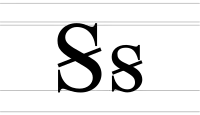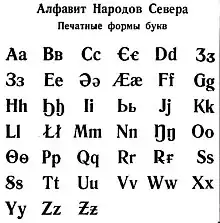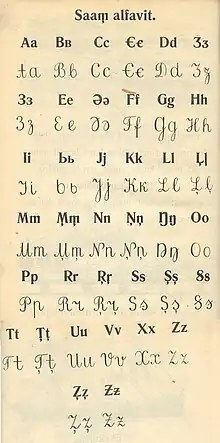| S with oblique stroke | |
|---|---|
| Ꞩ ꞩ | |
 | |
| Usage | |
| Writing system | Latin script |
| Type | Alphabetic |
| Language of origin | Latvian orthography until 1921; Lower Sorbian until 1950; Luiseño and Cupeño languages, Unified Northern Alphabet. |
| History | |
| Development |
|
| Other | |

Ꞩ, ꞩ, ẜ (S with oblique stroke) is an extended Latin letter that was used in Latvian orthography until 1921; ꞩ was also used in Lower Sorbian until 1950.[1] A variant of the letter S with a stroke, ⟨s̸⟩, is used in Luiseño[2] and Cupeño,[3] and has been accepted for Unicode edition 16.
Uses in alphabets
In Latvian orthography until 1921 it meant the sound IPA: [s] (while the S s meant the sound IPA: [z]). It was also used in the trigraph Ꞩch ẜch and the tetragraph Tẜch tẜch, denoted by the sounds IPA: [ʃ] and IPA: [t͡ʃ], respectively. Spelling reform Ꞩ ẜ ꞩ, Ꞩch ẜch, Tẜch tẜch were replaced by S s, Š š, Č č respectively.[4]
In the final version of the Unified Northern Alphabet, created in the USSR in the 1930s for the languages of the peoples of Siberia and the Far North, for the Selkup, Khanty and Mansi languages, it meant the sound IPA: [ʃ].[5]
Code positions
The forms are represented in Unicode as:
- U+A7A8 Ꞩ LATIN CAPITAL LETTER S WITH OBLIQUE STROKE
- U+A7A9 ꞩ LATIN SMALL LETTER S WITH OBLIQUE STROKE
The long s form with the bar (diacritic) is encoded at:
- U+1E9C ẜ LATIN SMALL LETTER LONG S WITH DIAGONAL STROKE
_246.jpg.webp) Latvian alphabet before 1921 (upper)
Latvian alphabet before 1921 (upper) Unified northern alphabet
Unified northern alphabet Sami alphabet. 1933 version
Sami alphabet. 1933 version
See also
References
- ↑ Latin Extended-D
- ↑ Chris Harvey/Languagegeek. 2004. Luiseño S with Stroke, <languagegeek.com>
- ↑ Jane H. Hill. 2005. A Grammar of Cupeño, University of California Press.
- ↑ Plaķis, Juris (1921). "Rīkojums par ortogrāfijas reformu". Izglītības Ministrijas Mēnešraksts (in Latvian). 2: 218. Archived from the original on 2016-04-06. Retrieved 2021-02-03.
- ↑ Материалы I всероссийской конференции по развитию языков и письменности народов Севера (3000 экз ed.). М.-Л.: Учпедгиз. Я. П. Алькор (Кошкин), И. Д. Давыдов. 1932.